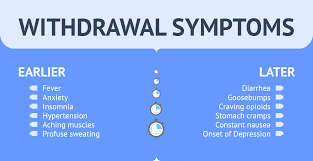When an individual suffering from addiction decides to quit, they may experience withdrawal symptoms. Withdrawal is the body’s natural response to ceasing drug use, and symptoms can range in intensity from mild to severe. The specific symptoms an individual experiences during withdrawal will depend on a number of factors, including the type of drug they were using, the severity of their addiction, and how long they have been using. Some common withdrawal symptoms include:
- Anxiety– This is often the most debilitating symptom of withdrawal and can make it very difficult to stick to quitting. It is not uncommon for individuals to feel on edge, panicked, or even experience paranoia during withdrawal.
- Depression– Quitting can lead to feelings of sadness and emptiness. It is important to remember that these feelings are temporary and will subside as your body adjusts to being drug-free. This may be one of the most difficult symptoms to manage, but it is important to remain positive and remind yourself that it will get better.
- Insomnia– Many people find it difficult to sleep during withdrawal, as they may be anxious or depressed. It is important to get as much rest as possible during this time to help your body heal. If you are having difficulty sleeping, try relaxation techniques such as yoga or meditation.
- Irritability– Drug cravings can lead to feelings of irritability and frustration. It is important to find healthy outlets for these emotions, such as exercise or talking to a friend or family member. Mood swings are also common during withdrawal.
- Fatigue– It is not uncommon to feel tired and run-down during withdrawal. This is your body’s way of telling you to slow down and rest. It is important to listen to your body and get as much rest as possible.
- Physical symptoms– Depending on the drug being used, withdrawal can also cause physical symptoms such as headaches, nausea, vomiting, sweating, and shaking. These symptoms are usually the most intense in the first few days after quitting and will gradually subside over time. Make sure to stay hydrated and get plenty of rest to help your body recover.
Withdrawal symptoms can be difficult to deal with, but there are a number of resources available to help you through this process. Here are some tips for managing withdrawal symptoms:
- Talk to your doctor– If you are planning on quitting, be sure to talk to your doctor first. They can help you develop a plan to safely detox from the drug and manage any withdrawal symptoms you may experience.
- Join a support group– There are many groups available to help people through the quitting process. These groups can provide emotional support and practical advice for dealing with withdrawal symptoms.
- Seek professional help– If you are struggling to deal with withdrawal symptoms on your own, seek professional help. A therapist or counselor can provide you with the tools you need to successfully manage your symptoms and overcome addiction. There are addiction recovery centers in Idaho and other states in the US available to help you through this difficult time.
Take it one day at a time. Quitting is a process, and it takes time to adjust to being drug-free. Be patient with yourself and take it one day at a time. Remember that each day you are getting closer to your goal of recovery.
